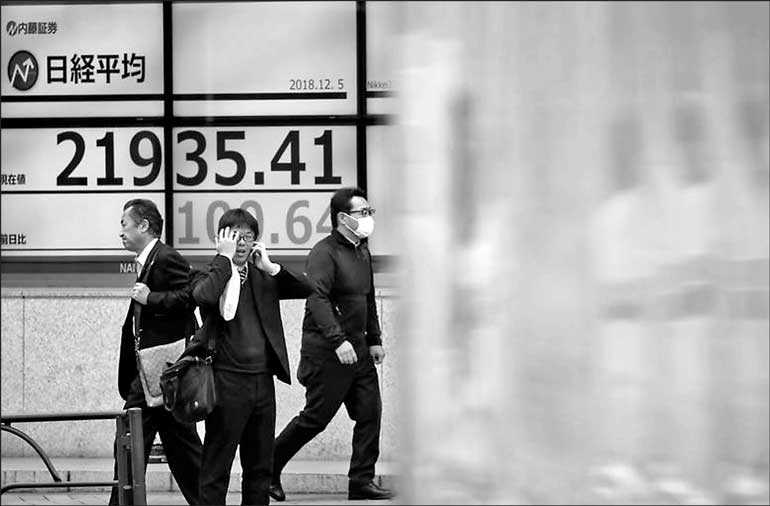Sunday Feb 22, 2026
Sunday Feb 22, 2026
Saturday, 10 August 2019 00:00 - - {{hitsCtrl.values.hits}}

TOKYO (Reuters): Asian shares inched up on Friday, helped by Wall Street’s rally, but fresh concerns about Sino-US trade ties capped gains in the region.
Weighing on risk appetite was a report from Bloomberg that Washington is delaying a decision about licenses for US firms to restart trade with Huawei Technologies.
That sent US stock futures down as much as 0.6% in Asian trade.
Pan-European Euro Stoxx 50 futures fell 0.2% in late Asian trade, indicating that European cash share markets will open a tad lower on Friday.
MSCI’s broadest index of Asia-Pacific shares outside Japan was 0.2% higher but on track to lose 2.3% for the week.
Japan’s Nikkei average gained 0.4%, while Australian stocks added 0.3% and South Korean shares climbed 1.1%.
Early gains by Chinese stocks were erased after data showed the country’s producer prices fell for the first time in three years in July, while a selloff in high-profile tech firms dampened already fragile sentiment.
The benchmark Shanghai Composite and the blue-chip CSI300 were down 0.8% and 1.0%, respectively, while Hong Kong’s Hang Seng eased 0.2%. On Wall Street on Thursday, the S&P 500 surged 1.9% - its largest one-day gain in about two months- while the Dow and the Nasdaq also advanced well more than 1%.
However, optimism was dented by the Bloomberg report, which added to concerns that deterioration in US-China relations could put additional strain on an already fragile global economy.
“The news about Huawei triggered the rise in the yen,” said Junichi Ishikawa, senior foreign exchange strategist at IG Securities. “This is a reminder that the US-China trade dispute remains a risk, and this risk is not receding.”
The yen strengthened as much as 0.4% against the dollar to 105.70 yen on worries triggered by the report on Huawei. US data pointed to a robust labour market as the number of Americans filing applications for unemployment benefits unexpectedly fell last week, allaying some worries about a recession and helping Treasury yields rise.
Benchmark 10-year Treasury yield closed 2.4 basis points higher at 1.715% after hitting 1.595% on Wednesday, which was its lowest level since October 2016. It last quoted at 1.698%. But others remained anxious on the outlook.
“Worries about trade war and currency policies will keep market volatility elevated. Rate cuts by various central banks this week underscored that the US-China confrontations are problems not just for the two economies but for the entire world,” said Yoshinori Shigemi, global market strategist at JPMorgan Asset Management.
“About a month ago, I had a feeling the global economy could pick up later this year but now downside risks are deepening, raising the chance of a recession.” The offshore yuan was stable versus the dollar even after China’s central bank set the yuan’s daily midpoint at 7.0136 per dollar, its weakest level since April 2, 2008.
The currency fetched 7.0505 per dollar in onshore trade, while offshore yuan traded at 7.0767, steady on the day.
But traders continued to pay close attention to US-China trade headlines to figure out Beijing and Washington’s next moves in their bruising tariff tussle.
“The US-China trade war is very serious. My hope is that the United States and China can find enough to agree on so that they can contain the push-and-shove that occurs when the emerging power meets the dominant power. The alternative is not pleasant,” said veteran investor Dan Fuss, vice chairman of Loomis Sayles.
The dollar index, which measures the greenback versus a basket of six major currencies, was little changed at 97.541 but on track for its biggest weekly decline since late June.
Sterling briefly hit its two-year low against the euro overnight after the Financial Times reported that Prime Minister Boris Johnson was preparing to hold an election in the days following Brexit. The pound was last quoted at 92.21 pence per euro, down 0.1% on the day, and was traded against the dollar at $ 1.2138, steady on the day.
In commodity markets, oil prices on Friday gave up some the previous day’s stellar gains, but expectations of more production cuts by OPEC were expected the underpin prices.
Brent crude retreated 0.1% to $ 57.32 per barrel and US West Texas Intermediate (WTI) crude eased 0.1% to $ 52.50.
Spot gold held near a more than six-year peak touched Wednesday, with rising 0.5% to $ 1,507.66 an ounce as investors continued to seek the safety of the precious metal.